Pollution DefinitionWhat is Pollution?The presence or introduction of dangerous substances into the environment is known as pollution, and it can appear in various ways, including air, water, and land pollution. The impacts of pollution on the environment and people's health can be quite serious. As it affects everyone, it calls for cooperation from all levels of society, from individuals to communities to governments. 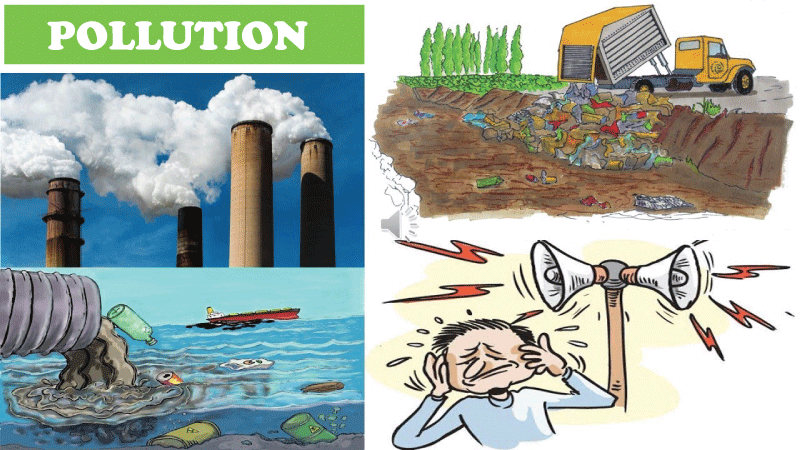
In terms of pollution, air pollution ranks among the worst. Pollutants like carbon monoxide, sulphur dioxide, nitrogen oxides, and particulate matter are released into the air, which causes it. These contaminants, such as heart disease and respiratory issues, can severely impact human health. Additionally, air pollution can impact the environment, harming ecosystems and crops. Burning fossil fuels and other industrial operations are two examples of human-caused air pollution. Air pollution, however, can also be caused by unavoidable occurrences like wildfires. Burning coal and oil for energy, transportation, and industrial activities largely causes air pollution. Deforestation, agriculture, and garbage disposal are among the more human activities that cause air pollution. Another type of pollution that impacts both the environment and people's health is water pollution. It results from the discharge of toxic components into water bodies like lakes, rivers, and seas. A few examples of these contaminants are chemicals, sewage, and agricultural waste. In addition to endangering aquatic life, water pollution can make water unsafe for use and consumption. Human activities such as garbage disposal, agriculture, and industrial processes can all lead to water pollution. These operations can cause chemicals and other contaminants to seep into water sources, polluting them. Water pollution can also be caused by sewage and agricultural waste. Water pollution can also be brought on by natural occurrences like storms and floods that wash contaminants into bodies of water. Solid waste, such as garbage and industrial waste disposed of improperly, leads to land pollution. In addition to destroying plant and animal habitats, this may cause soil and groundwater to become polluted. Land pollution can be caused by human activities, such as urbanization and industrial processes, as well as natural events, such as landslides and volcanic eruptions. Reducing the usage of pollutants through rules, rewards, and technological advancements is crucial to addressing pollution. Pollution reduction measures can also be implemented by properly disposing of waste and practicing conservation. Governments can enact laws restricting the use of pollutants and impose fines for violations. Businesses and individuals can adopt environmentally friendly practices with the help of incentives like grants and tax cuts. Technological advancements can also help reduce pollution by creating more efficient and cleaner energy sources and developing new waste disposal methods. Although it is still a major issue, governments, communities, and people must all come together to find solutions. It can involve little initiatives like cutting back on single-use plastics and commuting less and larger policy reforms. Supporting initiatives and laws to reduce pollution is another way people may contribute. 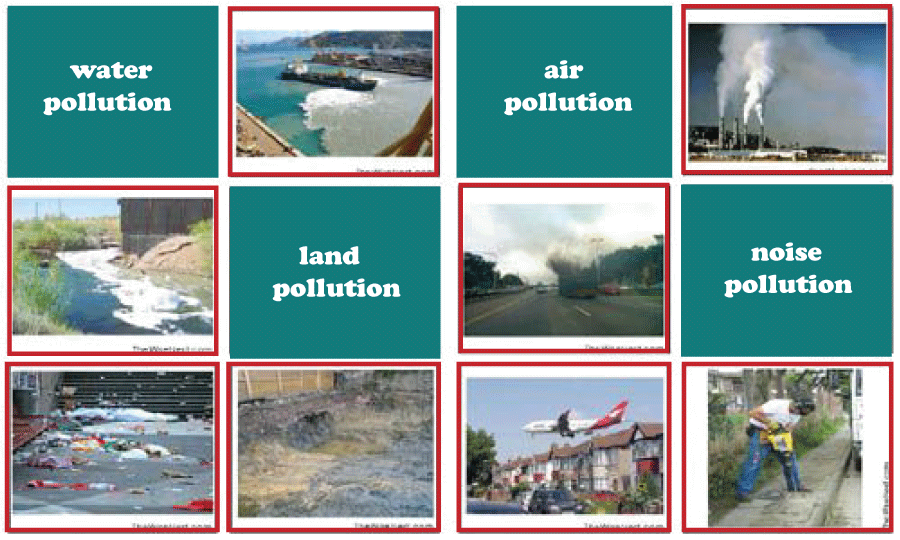
Causes of PollutionSeveral natural and artificial factors contribute to pollution. Human activity, especially industrialization, and urbanization, is a major contributor to pollution. An important source of pollution from human activity is the combustion of fossil fuels, agricultural practices, and garbage disposal. 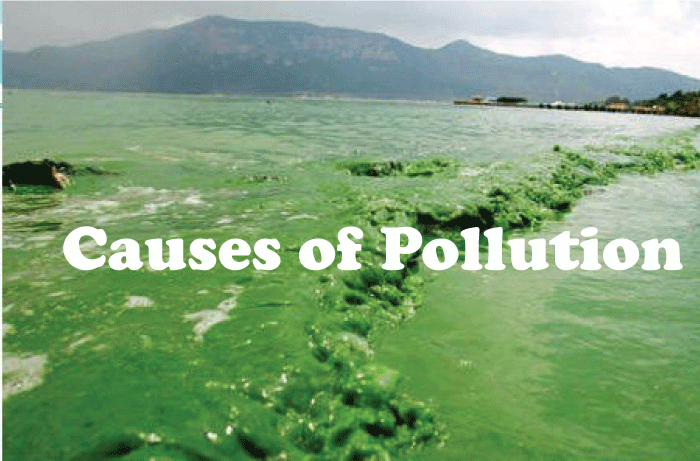
In conclusion, both manufactured and natural forces contribute to pollution. Major sources of pollution include human activities like garbage disposal, agriculture, combustion of fossil fuels, industrial processes, and urbanization. Natural occurrences like wildfires, volcanic eruptions, and storms can also cause pollution. It is essential to address all pollution causes to combat this global problem effectively. Effects of Pollution on the Environment and Human HealthPollution can have serious and wide-ranging consequences on the environment and human health. In addition to causing various health issues for people, pollution can destroy plants, animals, and entire ecosystems. The degradation of natural ecosystems is one of the pollution's most serious environmental effects. Pollutants can contaminate soil and water, making it difficult or impossible for plants and animals to survive. By lowering the quantity of sunlight plants receive and changing their chemical makeup, air pollution can also harm them. It may reduce biodiversity and the loss of crucial ecological functions like pest control and pollination. Through exposure to dangerous chemicals such as harmful particles in the air, sulphur dioxide, and nitrogen oxides, air pollution can also affect animals. The respiratory systems of animals may be harmed by these pollutants, making breathing difficult. The eyes, skin, and other parts of animals are similarly prone to damage. Additionally, air pollution can cause acid rain, which lowers the pH of water bodies and harms fish and other aquatic species. Animals might suffer from water pollution because it pollutes their habitats. Pollutants, including chemicals, heavy metals, and pathogens, can harm fish, other aquatic species, and plants. Aquatic animals may find it difficult to survive if there is less oxygen in the water due to pollution. Soil pollution can also harm plants by making it difficult for them to grow. Chemicals and heavy metals are two examples of pollutants that can pollute soil, making it difficult for plants to absorb the nutrients they require to develop. Because they have fewer food options, animals might also suffer from soil pollution. In addition to negatively affecting the environment, pollution can also negatively affect human health. Asthma, bronchitis, and lung cancer are just a few of the respiratory conditions that can be brought on by air pollution. Additionally, it can cause heart disease and stroke. Cancer, neurological abnormalities, and gastrointestinal illnesses are just a few of the health issues that can be brought on by water contamination. The poisoning of food and water supplies due to soil pollution can also harm human health. 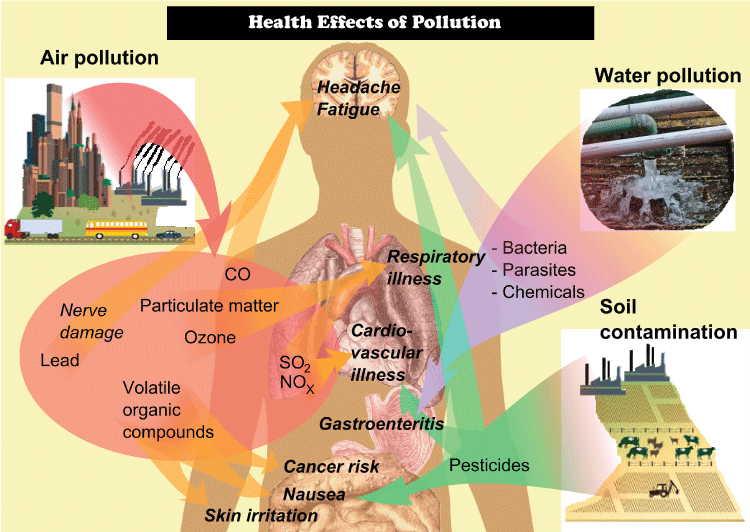
In conclusion, pollution can negatively impact the environment and human health significantly and unexpectedly. Along with causing various health issues for people, it can affect plants, animals, and entire ecosystems. The negative impacts of pollution on the ecosystem and human health serve as a reminder of how urgent it is to address this worldwide issue. Some of the Ways to Address PollutionAddressing pollution is a complex and ongoing task that requires the cooperation of individuals, businesses, and governments. There are several ways to address pollution, including reducing the use of pollutants, properly disposing of waste, and implementing conservation efforts.
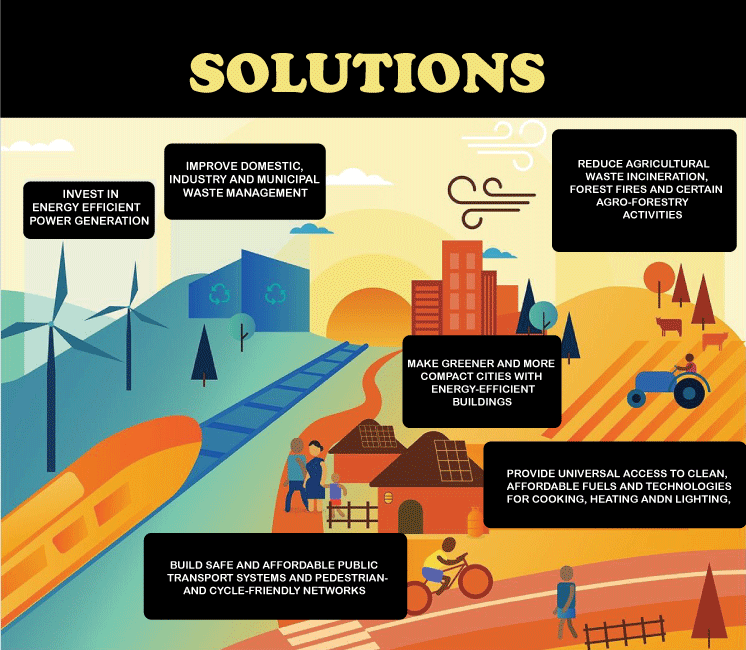
In conclusion, combating pollution is a difficult job requiring cooperation between people, organizations, and governments. Implementing conservation initiatives, reducing the usage of pollutants, and appropriately disposing of waste are all crucial approaches to reducing pollution. Additionally, laws and regulations to limit pollution can help ensure a cleaner and healthier environment for everyone by holding corporations and individuals accountable for their pollution-causing activities. The Importance of Cooperation Between Individuals, Communities, and Governments in Addressing PollutionPeople, communities, and governments must work together to effectively address the complicated and widespread pollution issue. All essential groups must be included for effective action to reduce and avoid pollution. Addressing pollution requires the participation of individuals. To reduce their negative environmental impact, they can be more thoughtful about the items they choose and how they live. People can lessen their carbon emissions by cycling, walking, or taking public transportation instead of driving, for instance, using energy-efficient appliances. They can also reduce the waste they create by recycling, composting, and using fewer single-use plastics. By cooperating to build a cleaner, healthier environment, communities can contribute significantly to the fight against pollution. Communities may try to persuade for renewable energy measures and measures for waste reduction, composting, and recycling. To stop pollution from entering the water and soil, citizens can also cooperate to clear up garbage and illegal dumping. Governments must play a significant role in the combat against pollution. They have the power to enforce pollution control laws and regulations, impose penalties on violators, and allocate financing for the study and advancement of clean technology. Tax breaks for using clean energy or financial assistance for purchasing electric vehicles can also be given to people and businesses to help them lessen their environmental effects. To make clean energy more available and affordable, governments can also act to upgrade the infrastructure required for clean energy sources like wind and solar energy. In conclusion, everyone must work together to combat pollution. Individual choices can make a big difference in pollution, such as reducing garbage and switching to renewable energy. To encourage environmental sustainability and clean up their neighborhoods, communities must cooperate. The implementation of laws and regulations, financing for Research and innovation, and incentives for clean energy production are all things that governments can do to reduce pollution. Collaboration across all groups is necessary to solve pollution and build a cleaner, healthier, and more sustainable future for everybody. The Role of Regulations, Incentives, and Technological Advancements in Reducing PollutionTechnology advancements, government subsidies, and laws are all effective instruments for reducing pollution, and they can help reduce the number of pollutants discharged into the environment and prevent environmental harm. Regulations are crucial in reducing pollution because they establish acceptable standards and ensure that businesses and individuals are held responsible for the pollution caused. The number of pollutants released into the air and water can be restricted by regulations, and those who breach these rules can be fined. Also, laws may ask businesses to adopt best management practices to reduce emissions and employ cleaner production methods. Incentives can also play an important role in reducing pollution by encouraging individuals and businesses to adopt environmentally friendly practices. For utilizing renewable energy, for instance, or buying environmentally friendly goods, governments may offer tax credits or subsidies. Additionally, incentives can persuade companies to spend money on more advanced, less polluting technology, which will help them save money and lessen their environmental impact. Another important factor in lowering pollution is technological innovation. Producing energy without releasing pollutants into the environment is now achievable due to the development of cleaner and more effective technologies like solar and wind power. Recycling and composting are two examples of technological developments in waste management that have decreased the volume of garbage dumped in landfills, significantly reducing pollution. In conclusion, laws, incentives, and new technology are all crucial instruments in the fight against pollution. Restrictions help in setting guidelines and preventing pollution by individuals and businesses. Incentives motivate people and companies to use environmentally friendly practices. More environmentally friendly technologies are produced to reduce pollution and stop environmental harm. All these instruments working together can make the environment cleaner and healthier. The Global Aspect of Pollution and the Need for International Cooperation to Address ItAll nations are impacted by pollution, which calls for international cooperation. The effects of pollution can spread across borders and have an international influence, affecting nations and populations far from the source. Pollution-related environmental issues can cross international boundaries and affect neighboring nations and regions. For instance, air pollution from one country can travel across borders and affect the air quality of nearby nations. Similarly, marine pollution from one nation can impair marine life in nearby nations and impact their economies, particularly those that depend on fishing and tourism. The resources, which cannot be handled by one country alone, are another factor in the requirement for international cooperation to combat pollution. A few examples of resources shared by several nations are the oceans, rivers, and air. International cooperation is necessary to guarantee these common resources' conservation and sustainable use since no nation can alone do it effectively. For instance, ocean pollution, such as plastic trash and oil spills, can influence many nations' economies and the health of marine life. The global interdependence of economies also highlights the need for international cooperation to address environmental problems such as pollution. The global economy is interconnected, so countries must work together to address environmental problems. For example, a country's industrial and economic activities can have far-reaching environmental impacts, affecting multiple countries and regions. Therefore, international cooperation is necessary to ensure that economic activities do not cause harm to the environment and the health of people in other countries. International agreements like the Paris Agreement and the UN Framework Convention on Climate Change offer a forum for nations to join together and work toward a solution to major environmental problems like pollution. These agreements encourage nations to work together to reduce pollution and lessen the effects of climate change. Nations may share information and resources, create best practices, and lessen their environmental effect while safeguarding the environment and citizens' health. In conclusion, pollution is a global problem affecting the environment and people's health worldwide. It requires international cooperation to be addressed effectively due to the cross-border nature of pollution, the shared resources that cannot be managed by one country alone, and the global interdependence of economies. International agreements such as the Paris Agreement provide a platform for countries to work together to address environmental issues such as pollution and ensure a sustainable future for all. Current Statistics and Data on Pollution Levels and Trends in Different Regions and SectorsThe World Health Organization (WHO) estimates that nine out of ten individuals worldwide are exposed to air pollution levels beyond the WHO's established limits. The worst air pollution is found in low and middle-income nations, especially in metropolitan areas, where it can be up to five times worse than in rural areas. In addition, air pollution is responsible for an estimated 7 million premature deaths each year, making it one of the leading causes of death worldwide. The United Nations Development Programme (UNDP) estimates that 80% of the wastewater produced worldwide is released into the environment untreated, resulting in significant water contamination. The spread of waterborne infections and harm to aquatic life are just two serious effects of this pollution on human health and the environment. 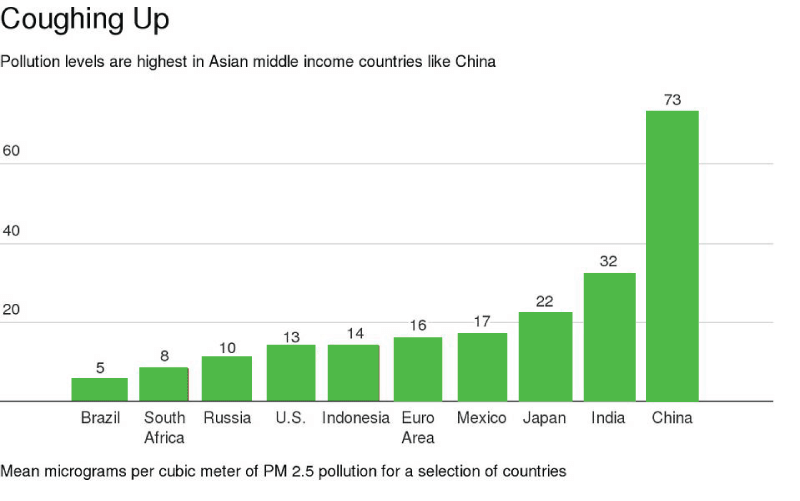
Soil pollution is also a growing problem, particularly due to the increased use of hazardous chemicals in agriculture and industry. Soil pollution can significantly impact human health, the environment, and food security, as contaminated soil can spread harmful chemicals to crops and food. Asia is one of the continents with the highest pollution levels in terms of regional trends. A report by the Asian Development Bank claims that the area, primarily China and India, is to blame for more than 60% of the world's air pollution. The region also has significant issues with water pollution since many countries' rivers and lakes have been severely contaminated by industrial and agricultural waste. The energy sector is one of the main sources of pollution regarding sectoral trends. In particular, carbon dioxide (CO2) emissions from burning fossil fuels for energy are a significant source of air pollution and a factor in global warming. With emissions from vehicles, trucks, and aeroplanes contributing to both pollution and global warming, the transportation industry is also a substantial source of air pollution. Asia is one of the regions most affected by pollution, with the energy sector and agriculture being the two largest contributors. To effectively address pollution and its impacts, governments and industries must take action and implement measures to reduce pollution levels and protect the environment and health of people.
Next TopicProper Fraction Definition
|
 For Videos Join Our Youtube Channel: Join Now
For Videos Join Our Youtube Channel: Join Now
Feedback
- Send your Feedback to [email protected]
Help Others, Please Share










